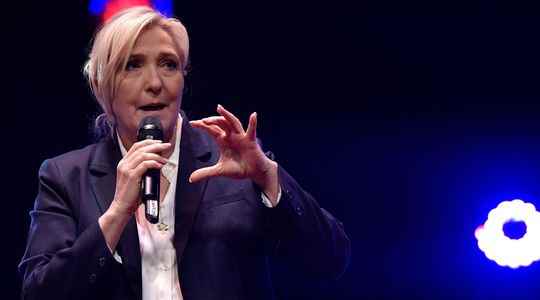He is a Luxembourger who formulates aloud what many Europeans think in a whisper. Arriving at a meeting of the Twenty-Seven the day after the first round, the Minister of Foreign Affairs of the smallest country in the EU is alarmed: “I hope that we will not have Marine Le Pen as French president, it would be a break for Europe as a project of peace and values. That would put us completely on a different path. The French must prevent that!”
The frankness of the socialist Jean Asselborn contrasts with the official caution of the European Commission or the Council, which never openly take sides in a national election. This does not prevent many eyes from being turned towards France. Especially since in European circles, the star of Emmanuel Macron has not faded. “France is a driving force, I hope it will remain so”, slips Vera Jourova, vice-president of the Commission in charge of values. Here, perhaps more than elsewhere, a victory for the RN candidate is therefore difficult to envisage. “Some do not really believe in it and think that in the end the French will be rational, sums up a diplomat. Others are really worried because they fear a radical weakening at the worst moment.”
The Hungarian model, a disaster for the EU
Since the beginning of the Russian offensive in Ukraine, the Europeans have presented a united front – even Russophile Hungary has embraced the sanctions. But with Marine Le Pen in power, her Prime Minister, Viktor Orban, would have a strong ally. “It would be an opportunity to create a dynamic. It would strengthen patriotic forces, the idea of a Europe based on mutual respect for sovereignties and not on ideological blackmail from the Brussels bureaucracy”, explains Balazs Hidveghi, Hungarian MEP of Fidesz. “Viktor Orban, we could manage, but we will not succeed with the second European economic power”, is frightened on the contrary his Belgian ecologist colleague Philippe Lamberts.
Calling into question the primacy of European law by referendum, tensions over the rule of law: the declarations of Marine Le Pen make it possible to anticipate resistance modeled on that of Budapest or Warsaw. The Commission services are already following his campaign closely: risk of discrimination, possible attacks on the right to asylum, the independence of justice or the freedom of the press… His decision to refuse access to conferences release to certain journalists did not go unnoticed. “We must not have any illusions about the real intentions, says Vera Jourova. We must not underestimate the risks associated with plans that go against the fundamental principles of the Union.”
Another significant concern is the consequences for the European economy. “In France, the first victim of a Marine Le Pen victory would be purchasing power,” said a Brussels source, citing the possible rise in debt interest rates and systemic risk for the euro. “His election would provoke a very negative reaction on the markets, abounds the former Italian Prime Minister Enrico Letta, president of the Jacques Delors Institute. Europe would then have to react. I don’t know if it would be able to. ”
The difficult European alliances of the RN
In Brussels, some have read the program of the candidate. The promise to reduce France’s contribution to the Community budget by 5 billion, without mentioning a reduction in the subsidies received in return, raises some eyebrows. “She wants an ‘alliance of nations’. But what is the EU, if not an alliance of nations?, ironically an interlocutor. If she wants to unravel a part while keeping what suits her , she will have to enter the system and start trading.”
Some try to reassure themselves by pointing out that the RN has still not succeeded in founding a group in the European Parliament with the Poles of PiS and the Hungarians of Fidesz. “Good luck with the Polish Prime Minister on Russia!” tackles a diplomat. Because Brussels is above all a great platform for negotiation: to change things, either you have to leave like the British, or you have to convince the 26 other countries. However, Marine Le Pen has ruled out a Frexit. “We are not going to go overnight from day to night, anticipates a high-ranking European source. But, in all likelihood, no one will turn their back on him. If his peers in the European Council recognize his legitimacy, the risk is paralysis or to see her exert, with other leaders, a real influence on European compromises.”
